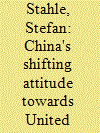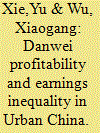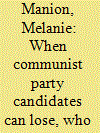|
|
|
Sort Order |
|
|
|
Items / Page
|
|
|
|
|
|
|
| Srl | Item |
| 1 |
ID:
084465


|
|
|
|
|
| Publication |
2008.
|
| Summary/Abstract |
While China has been portrayed as a reluctant supporter of UN peacekeeping in the past, it has voted in favour of every newly established UN peacekeeping operation since the beginning of the new millennium. Previous studies of China's behaviour in UN peacekeeping explained this phenomenon primarily with recent shifts in its foreign and security policy rather than with changes in UN peacekeeping itself. This article analyses China's voting behaviour in the UN Security Council on peacekeeping resolutions in the context of the evolving concepts of UN peacekeeping. It argues that China's recent enthusiasm for these missions is the result of two developments. On the one hand, Beijing was able to reinterpret its understanding of UN peacekeeping after its experience in the 1990s, especially with regard to the use of force; while on the other hand, the way UN peacekeeping missions are conducted was reformed after the Brahimi Report in 2000, which made UN peacekeeping more agreeable to the China.
|
|
|
|
|
|
|
|
|
|
|
|
|
|
|
|
| 2 |
ID:
084461


|
|
|
|
|
| Publication |
2008.
|
| Summary/Abstract |
Prior research has debated the relative importance of such factors as human capital, political capital and region in determining workers' earnings in reform-era urban China. This article argues that a main agent of social stratification in contemporary China continues to be the danwei, the work unit. Using data from a 1999 survey we conducted in three large Chinese cities, Wuhan, Shanghai and Xi'an, we assess the extent to which workers' earnings (including regular wages, bonuses and subsidies) depend on the profitability of their danwei. Results show that the financial situation of the danwei is one of the most important determinants of earnings in today's urban China. Furthermore, the importance of danwei profitability does not vary by city or by employment sector.
|
|
|
|
|
|
|
|
|
|
|
|
|
|
|
|
| 3 |
ID:
084457


|
|
|
|
|
| Publication |
2008.
|
| Summary/Abstract |
Economic inequality has increased greatly in China since the end of state socialist industry and collective agriculture, but the story of inequality is much more complex than just the rural-urban and coastal-inland dichotomies or the relative contributions of inter-regional and intra-regional inequality. Even within inland rural areas, inequality between villages and within villages has also increased greatly. In 2005-06, we were fortunate to be able to work with the Sichuan Nationalities Research Institute to re-survey 90 per cent of 300 families in three villages that we had originally surveyed in 1988. On the basis of these surveys and of ethnographic information, we found that income inequality had increased quite dramatically in all three villages. In structural terms, the primary reason for this increase was the shift from labour power to small-scale capital as the primary source of family income, a shift that occurred differently in each village.
|
|
|
|
|
|
|
|
|
|
|
|
|
|
|
|
| 4 |
ID:
084462


|
|
|
|
|
| Publication |
2008.
|
| Summary/Abstract |
In recent years, China has instituted a variety of reforms to its hukou system, an institution with the power to restrict population mobility and access to state-sponsored benefits for the majority of China's rural population. A wave of newspaper stories published in late 2005 understood the latest round of reform initiatives to suggest that the hukou is set to be abolished, and that rural residents will soon be "granted urban rights." This article clarifies the basic operations of the hukou system in light of recent reforms to examine the validity of these claims. We point out that confusion over the functional operations of the hukou system and the nuances of the hukou lexicon have contributed to the overstated interpretation of the initiative. The cumulative effect of these reforms is not abolition of the hukou, but devolution of responsibility for hukou policies to local governments, which in many cases actually makes permanent migration of peasants to cities harder than before. At the broader level, the hukou system, as a major divide between the rural and urban population, remains potent and intact.
|
|
|
|
|
|
|
|
|
|
|
|
|
|
|
|
| 5 |
ID:
084480


|
|
|
|
|
| Publication |
2008.
|
| Summary/Abstract |
By taking minban education at the level of basic education in Shanghai as an example, this article studies the processes of policy implementation in mainland China. Based on 65 interviews conducted during 2001 and 2004, the article analyses two policies on minban education which have metamorphosed during implementation. It argues that the Chinese mode of state governance has shifted from Party despotism to a mode that tolerates and embraces local deviation.
|
|
|
|
|
|
|
|
|
|
|
|
|
|
|
|
| 6 |
ID:
084458


|
|
|
|
|
| Publication |
2008.
|
| Summary/Abstract |
Based on a 2001 survey, this study finds increased disparities in land distribution in rural Zhejiang. Regression analyses yield three main findings. First, increased disparities in land distribution are associated with growth of land markets. Second, rural households who acquired land through markets significantly increased their farm income. Land markets thus gave rise to a new venue of income generation and increased inequality in farm income. Widening disparities in land rights and farm income, however, did not constitute a further retreat from equality, but instead had compensatory effects on overall inequality, as land markets brought up families who would have fallen at the lower end of income distribution in the absence of such markets. Third, land markets increased efficiency in farming, as households who acquired land were using it more productively. In rural Zhejiang, growth of land markets broadened access to market opportunities and enhanced both efficiency and equity.
|
|
|
|
|
|
|
|
|
|
|
|
|
|
|
|
| 7 |
ID:
084463


|
|
|
|
|
| Publication |
2008.
|
| Summary/Abstract |
This article draws on Party and government documents, Chinese-language books and articles, interviews and firsthand observation, and electoral outcome data to contribute to the emerging literature on the changing role of people's congresses in mainland China. It focuses on the crucially important but neglected relationship between local congresses and local Communist Party committees in the selection of congress and government leaders. It analyses the 1995 reforms to Party regulations and the law, which resulted in electoral losses of more than 17,000 Communist Party candidates in the first set of elections after 1995. It concludes that the reforms created the conditions for local congress delegates to matter - and delegates responded. More broadly, it concludes that congressional assertiveness has significant (although not radical) implications for the relationship between the congresses and Party committees. The winners in the broader (not narrowly electoral) sense of the term are both the congresses and the ruling Communist Party, strengthened as an organization with selection of leaders opened up to more players.
|
|
|
|
|
|
|
|
|
|
|
|
|
|
|
|
|
|
|
|
|